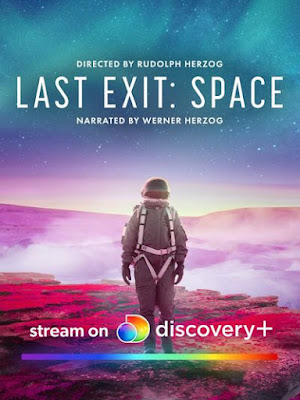It was not as bad as the legendary Soviet sleep deprivation experiment, but the infamous Russian 1999-2000 isolation test should have become an international scandal when a Canadian crewmember faced harassment from her fellow test-subject. Naturally, the Russians blamed her. She finally breaks her silence to help explain the extreme challenges of interplanetary travel and prospective space colonization in Rudolph Herzog’s Last Exit: Space, narrated by his father, Werner, which premieres this Thursday on Discovery+.
Herzog’s approach is not surprisingly similar to that of his father (who is also on-board as an executive producer), especially in a doc like Lo and Behold. Essentially, the Herzogs explore the obstacles to space colonization and the potential scientific methods for overcoming them, like antimatter drives and suspended animation. However, in every instance, science has a long way to go to facilitate our prospective interplanetary expansion.
Not so ironically, the social challenges might be the hardest to overcome. The unfortunate French-Canadian representative of the Canadian Space Agency speaks at length about her experiences in the Russian simulation. Perhaps the best line in the film goes to the sociologist, who likens potential Mars colonies to Amazon fulfillment warehouses (sounds like fun, right?).
However, the lack of participation of the new space-faring titans, especially Elon Musk is a glaring oversight. Instead, we just get speculation of intergalactic class-based exploitation, posited like a leftwing version of the revolution in Heinlein’s The Moon is a Harsh Mistress.
Regardless, Rudolph Herzog keeps things rather snappy, interviewing either the very smart (such as astronaut Mike Foale) or the very eccentric, like the Brazilian UFO cult, who are quickly eliminated as a possible resource for deep space travel.
Eventually, the film starts to question whether space colonization is even ethical, given our custodianship of our own planet. That gives rise to environmental posturings that are so predictable, they really are a crushing bore. However, the first sixty-five minutes of the eighty-minute film are consistently interesting and sometimes rather sly.
Whether you love him or hate him, you have to give Musk credit for keeping space exploration within reach. Without him, Russian would really be the gatekeeper to space and all the research and adventurous dreams that can only be pursued there. Films like Sky Line better explain the risks of retreating from space, but at least Last Exit hints at the long-term possibilities. Recommended for space boosters and Herzog fans (but feel free to bail when it turns lectury), Last Exit: Space starts streaming Thursday (3/10) on Discovery+.

